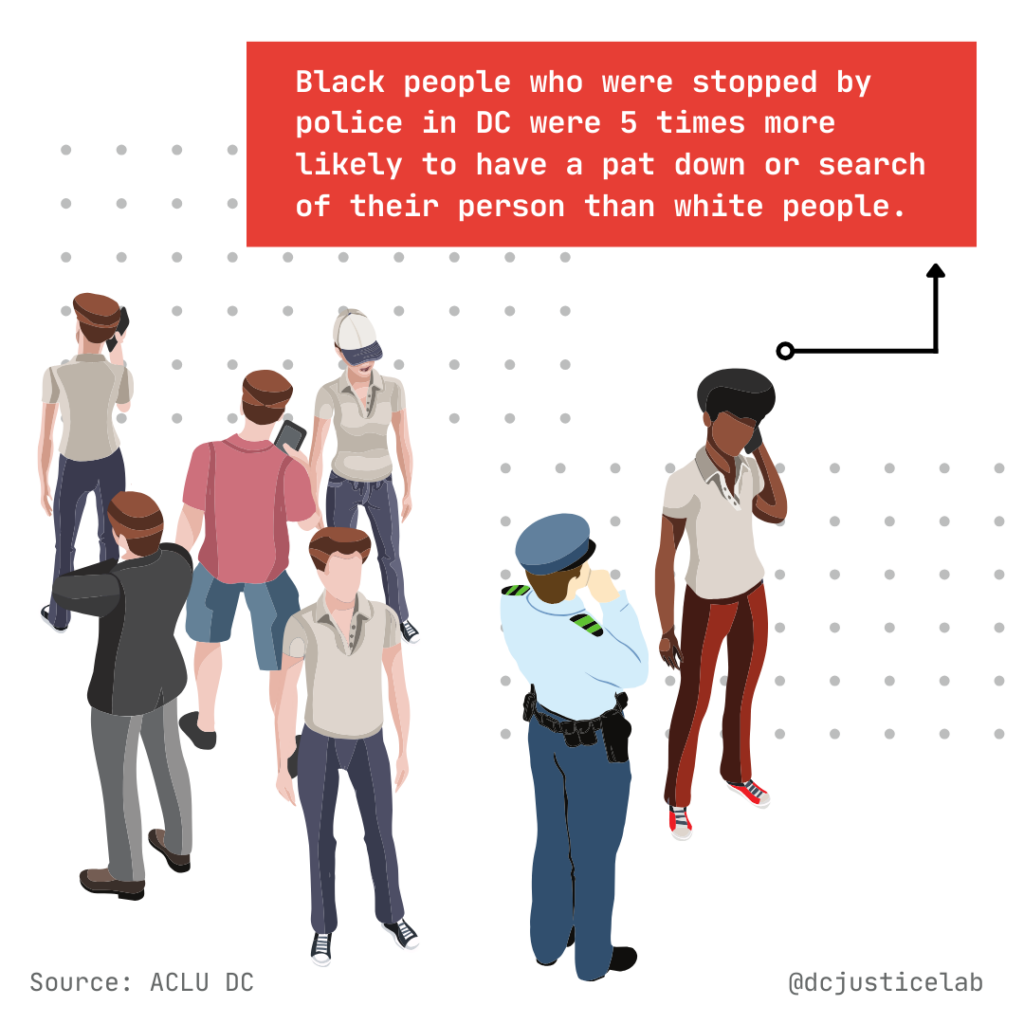Body Searches
Invasive body searches strip people of their dignity, privacy, and cause trauma.
While Metropolitan Police Department (MPD) policy limits invasive searches, lawsuits have shown that some officers violate these policies. These painful and humiliating invasive searches cause unnecessary harm, can cause long-lasting trauma, and do not necessarily yield evidence of a crime. States like Washington, Ohio, Wisconsin, and California, have changed their laws to explicitly ban invasive searches. Building on recommendations from the Police Reform Commission, DC should pass laws that explicitly restrict strip, squat, and body cavity searches in the community and only allow the search of someone’s body to occur when a doctor says it’s necessary and completes it at their medical facility.

What you need to know
An invasive body search harms and humiliates individuals.
An invasive body search can include touching the underwear of a person or a pat down search of someone’s breast or genital area, a strip or squat search, or penetration through a body cavity search. All types of body search can be intimidating and degrading, and the more intrusive the method, the stronger the feeling of invasion will be. For young people, a strip search can cause anxiety, depression, loss of concentration, sleep disturbances, difficulty performing in school, fear, shame, guilt, and depression. Consistent with the research that shows those impacted by police violence can experience long-lasting trauma, a DC resident who experienced an invasive search said it caused, “depression, anxiety, [and] ridicule.” Organizations like the American Bar Association and the Inter-American Commission on Human Rights have called for the outright ban of body cavity searches in correctional settings.
MPD policy regulates invasive searches, but police have still performed them.
Since 2014, MPD General Order 502.01 limited the use of strip searches and squat searches; body cavity searches are strictly prohibited under the policy. But investigations of officers and lawsuits have shown the practice still occurs. One officer was the subject of more than 20 investigations for identical invasive search practices. At a departmental disciplinary hearing, officers testified that invasive searches are both common practice and approved by veteran officers. They also said that there were stark differences between what officers are taught at the police academy and the way officers tend to respond while on patrol.
DC lawsuits over invasive searches have been costly.
Settlements for invasive searches are included among the $90 million in settlements for police misconduct between 2010 and 2020. In Horse v. District of Columbia, DC settled for $1.6 million for a number of violations that included invasive searches. In Cottingham v. Lojacono, the District paid out an undisclosed settlement amount to one party, and another six-figure settlement to another party an officer sexually assaulted just minutes later.
Other places are expanding oversight and codifying policies to stop body searches.
States such as Washington, Ohio, Wisconsin, and California, have codified procedures for body searches in order to limit damaging consequences. Some cities are trying to address these violations through different means. Aiken, South Carolina, and Charlottesville, Virginia have created civilian review boards in response to egregious and pervasive invasive searches conducted by their police forces. DC’s Office of Police Complaints does not explicitly have the power to order an officer to stop taking certain actions, and the DC Council did not pass legislation that would have expanded this type of power.
WHERE TO LEARN MORE
The New York Times September 2024
WJLA December 2018
Washington City Paper June 2020
Lawsuit August 2016
Lawsuit August 2016
Lawsuit March 2022
American Journal of Public Health December 2014
Our Solutions
DC should restrict body searches by passing a law to:
- Prohibit strip and squat, and cavity searches in the community;
- Limit cavity searches to only instances when a doctor can perform it, and only when the the doctor deems it necessary;
- Place limits on when someone’s undergarment, or patting down search can occur in the field, and limit squat and cavity searches during the booking process or when someone is in jail.
Contact us about this topic
special thanks
Victoria McCullough ★ Amanda McAree




